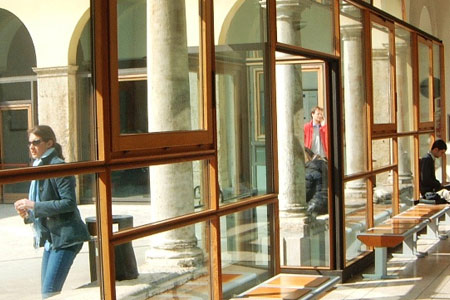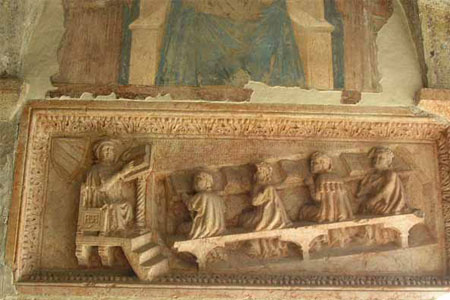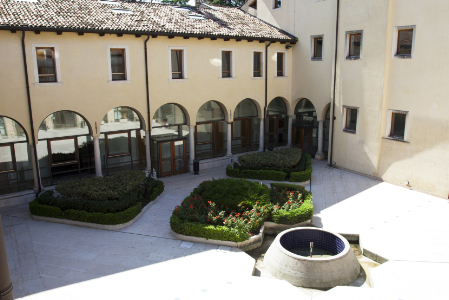|
Combined Bachelor's + Master's degree in Law
Course partially running
|
Criminal Law 1 (2025/2026)
|
9
|

|
9
|
|
|
Combined Bachelor's + Master's degree in Law
Course partially running
|
Criminal law 2 (2025/2026)
|
9
|
|
9
|
|
|
Master's degree in Law and criminology studies for security and intelligence
|
Criminal Law and Criminal Procedure for Security and Intelligence (2025/2026)
|
12
|
|
3
|
DIRITTO PENALE, SICUREZZA E INTELLIGENCE
|
|
Master's degree in Emergency Governance
Course partially running
|
Criminal Law for public administrations (2025/2026)
|
6
|
|
6
|
|
|
Master's degree in Law for Technologies and Sustainable Innovation
Course partially running
|
Criminal law of Information and Communication Technologies (2025/2026)
|
6
|
|
3
|
|
|
Combined Bachelor's + Master's degree in Law
Course partially running
|
comparative criminal law (2024/2025)
|
6
|

|
4
|
|
|
Combined Bachelor's + Master's degree in Law
Course partially running
|
Corporate and Economic Criminal Law (2024/2025)
|
6
|

|
1
|
|
|
Postgraduate Specialisation in Legal Medicine
|
Criminal Law (2024/2025)
|
1
|
|
1
|
|
|
Combined Bachelor's + Master's degree in Law
Course partially running
|
Criminal law 2 (2024/2025)
|
9
|

|
9
|
|
|
Master's degree in Emergency Governance
Course partially running
|
Criminal Law for public administrations (2024/2025)
|
6
|

|
6
|
|
|
Master's degree in Law for Technologies and Sustainable Innovation
Course partially running
|
Criminal law of Information and Communication Technologies (2024/2025)
|
6
|

|
3
|
|
|
PERCORSO 60 CFU CLASSE A046
|
Didattica del diritto penale (2024/2025)
|
1
|

|
1
|
|
|
Combined Bachelor's + Master's degree in Law
Course partially running
|
comparative criminal law (2023/2024)
|
6
|

|
4
|
|
|
Combined Bachelor's + Master's degree in Law
Course partially running
|
Corporate and Economic Criminal Law (2023/2024)
|
6
|

|
1
|
|
|
Postgraduate Specialisation in Legal Medicine
|
Criminal Law (2023/2024)
|
1
|
|
1
|
|
|
Combined Bachelor's + Master's degree in Law
Course partially running
|
Criminal law 2 (2023/2024)
|
9
|

|
9
|
|
|
Master's degree in Emergency Governance
Course partially running
|
Criminal Law for public administrations (2023/2024)
|
6
|

|
6
|
|
|
Master's degree in Law for Technologies and Sustainable Innovation
Course partially running
|
Criminal law of Information and Communication Technologies (2023/2024)
|
6
|

|
3
|
|
|
PhD in European and International Law
|
Mandatory teaching activities (teachers external to the Faculty Board) (2023/2024)
|
23
|
|
0.5
|
Cybersecurity for Artificial Intelligence e Medical Device Security: quale ruolo per il diritto penale alla luce delle recenti proposte europee?
|
|
PhD in European and International Law
|
Teaching activities prof. Flor (2023/2024)
|
5
|
|
1
|
Cybercrime e Cybersecurity
|
|
PERCORSO 60 CFU CLASSE A046
|
Didattica del diritto penale (2023/2024)
|
1
|

|
1
|
|
|
Combined Bachelor's + Master's degree in Law
Course partially running
|
Corporate and Economic Criminal Law (2022/2023)
|
6
|

|
3
|
|
|
Postgraduate Specialisation in Legal Medicine
|
Criminal Law (2022/2023)
|
1
|
|
1
|
|
|
Postgraduate Specialisation for Legal Professions
|
Criminal Law 1 (2022/2023)
|
0
|
|
|
|
|
Combined Bachelor's + Master's degree in Law
Course partially running
|
Criminal law 2 (2022/2023)
|
9
|

|
9
|
|
|
Master's degree in Emergency Governance
Course partially running
|
Criminal Law for public administrations (2022/2023)
|
6
|

|
6
|
|
|
Postgraduate Specialisation for Legal Professions
|
Criminal Law II (2022/2023)
|
0
|
|
|
|
|
Master's degree in Law for Technologies and Sustainable Innovation
Course partially running
|
Criminal law of Information and Communication Technologies (2022/2023)
|
6
|

|
3
|
|
|
Combined Bachelor's + Master's degree in Law
Course partially running
|
Corporate and Economic Criminal Law (2021/2022)
|
6
|

|
3
|
|
|
Postgraduate Specialisation in Legal Medicine
|
Criminal Law (2021/2022)
|
1
|
|
0.5
|
|
|
Postgraduate Specialisation for Legal Professions
|
Criminal Law 1 (2021/2022)
|
0
|

|
|
|
|
Combined Bachelor's + Master's degree in Law
Course partially running
|
Criminal law 2 (2021/2022)
|
9
|

|
9
|
|
|
Master's degree in Emergency Governance
Course partially running
|
Criminal Law for public administrations (2021/2022)
|
6
|

|
6
|
|
|
Postgraduate Specialisation for Legal Professions
|
Criminal Law II (2021/2022)
|
0
|
|
|
|
|
Combined Bachelor's + Master's degree in Law
Course partially running
|
Criminal law of Information and Communication Technologies (2021/2022)
|
6
|

|
3
|
|
|
Postgraduate Specialisation in Legal Medicine
|
Criminal Law (2020/2021)
|
1
|
|
0.5
|
|
|
Combined Bachelor's + Master's degree in Law
Course partially running
|
Criminal law 2 (2020/2021)
|
9
|

|
9
|
|
|
Master's degree in Emergency Governance
Course partially running
|
Criminal Law for public administrations (2020/2021)
|
6
|

|
6
|
|
|
Postgraduate Specialisation for Legal Professions
|
Criminal Law II (2020/2021)
|
0
|

|
|
|
|
Combined Bachelor's + Master's degree in Law
Course partially running
|
Criminal law of Information and Communication Technologies (2020/2021)
|
6
|

|
3
|
|
|
Postgraduate Specialisation for Legal Professions
|
Elementi di informatica giuridica (2020/2021)
|
0
|
|
|
|
|
Combined Bachelor's + Master's degree in Law
Course partially running
|
Criminal Law 1 (2019/2020)
|
9
|

|
2
|
|
|
Postgraduate Specialisation for Legal Professions
|
Criminal Law 1 (2019/2020)
|
0
|

|
|
|
|
Combined Bachelor's + Master's degree in Law
Course partially running
|
Criminal law 2 (2019/2020)
|
9
|

|
4
|
|
|
Master's degree in Emergency Governance
Course partially running
|
Criminal Law for public administrations (2019/2020)
|
6
|

|
6
|
|
|
Postgraduate Specialisation for Legal Professions
|
Criminal Law II (2019/2020)
|
0
|

|
|
|
|
Combined Bachelor's + Master's degree in Law
Course partially running
|
Criminal law of Information and Communication Technologies (2019/2020)
|
6
|

|
3
|
|
|
Combined Bachelor's + Master's degree in Law
Course partially running
|
Criminal Law 1 (2018/2019)
|
9
|

|
2
|
|
|
Postgraduate Specialisation for Legal Professions
|
Criminal Law 1 (2018/2019)
|
0
|
|
|
|
|
Combined Bachelor's + Master's degree in Law
Course partially running
|
Criminal law 2 (2018/2019)
|
9
|

|
4
|
|
|
Master's degree in Emergency Governance
Course partially running
|
Criminal Law for public administrations (2018/2019)
|
6
|
|
6
|
|
|
Postgraduate Specialisation for Legal Professions
|
Criminal Law II (2018/2019)
|
0
|
|
|
|
|
Combined Bachelor's + Master's degree in Law
Course partially running
|
Criminal law of Information and Communication Technologies (2018/2019)
|
6
|

|
3
|
|
|
Postgraduate Specialisation for Legal Professions
|
Criminal Law 1 (2017/2018)
|
0
|
|
|
|
|
Combined Bachelor's + Master's degree in Law
Course partially running
|
Criminal law 2 (2017/2018)
|
9
|

|
1
|
|
|
Master's degree in Emergency Governance
Course partially running
|
Criminal Law for public administrations (2017/2018)
|
6
|

|
6
|
|
|
Postgraduate Specialisation for Legal Professions
|
Criminal Law II (2017/2018)
|
0
|
|
|
|
|
Combined Bachelor's + Master's degree in Law
Course partially running
|
Criminal law of Information and Communication Technologies (2017/2018)
|
6
|

|
3
|
(UL1)
|
|
Combined Bachelor's + Master's degree in Law
Course partially running
|
International criminal law (2017/2018)
|
6
|

|
3
|
|
|
Postgraduate Specialisation for Legal Professions
|
Criminal Law 1 (2016/2017)
|
0
|
|
|
|
|
Combined Bachelor's + Master's degree in Law
Course partially running
|
Criminal law 2 (2016/2017)
|
9
|

|
1
|
|
|
Master's degree in Emergency Governance
Course partially running
|
Criminal Law for public administrations (2016/2017)
|
6
|

|
6
|
|
|
Postgraduate Specialisation for Legal Professions
|
Criminal Law II (2016/2017)
|
0
|
|
|
|
|
Combined Bachelor's + Master's degree in Law
Course partially running
|
Criminal law of Information and Communication Technologies (2016/2017)
|
6
|

|
4
|
|
|
Combined Bachelor's + Master's degree in Law
Course partially running
|
International criminal law (2016/2017)
|
6
|

|
3
|
|
|
Postgraduate Specialisation for Legal Professions
|
Criminal Law 1 (2015/2016)
|
0
|
|
|
|
|
Combined Bachelor's + Master's degree in Law
Course partially running
|
Criminal law 2 (2015/2016)
|
9
|
|
1
|
|
|
Postgraduate Specialisation for Legal Professions
|
Criminal Law II (2015/2016)
|
0
|
|
|
|
|
Combined Bachelor's + Master's degree in Law
Course partially running
|
Criminal law of Information and Communication Technologies (2015/2016)
|
6
|
|
4
|
|
|
Combined Bachelor's + Master's degree in Law
Course partially running
|
International criminal law (2015/2016)
|
6
|
|
3
|
(UL3)
|
|
Postgraduate Specialisation for Legal Professions
|
Criminal Law 1 (2014/2015)
|
0
|
|
|
|
|
Combined Bachelor's + Master's degree in Law
Course partially running
|
Criminal law 2 (2014/2015)
|
9
|
|
1
|
|
|
Postgraduate Specialisation for Legal Professions
|
Criminal Law II (2014/2015)
|
0
|
|
|
|
|
Bachelor’s degree in Law Services
Course not running
|
Criminal law of Information and Communication Technologies (2014/2015)
|
6
|
|
4
|
|
|
Combined Bachelor's + Master's degree in Law
Course partially running
|
International criminal law (2014/2015)
|
6
|
|
1
|
(UL2)
|
|
Bachelor’s degree in Law Services
Course not running
|
Criminal law of Information and Communication Technologies (2013/2014)
|
6
|
|
4
|
|
|
Combined Bachelor's + Master's degree in Law
Course partially running
|
International criminal law (2013/2014)
|
6
|
|
2
|
|
|
Bachelor’s degree in Law Services
Course not running
|
Criminal law of Information and Communication Technologies (2012/2013)
|
6
|
|
3
|
|
|
Combined Bachelor's + Master's degree in Law
Course partially running
|
International criminal law (2012/2013)
|
6
|
|
5
|
|
|
Bachelor’s degree in Law Services
Course not running
|
Criminal law of Information and Communication Technologies (2011/2012)
|
6
|
|
2
|
|
|
Bachelor’s degree in Law Services
Course not running
|
Criminal law of Information and Communication Technologies (2010/2011)
|
6
|
|
3
|
|
|
Combined Bachelor's + Master's degree in Law
Course partially running
|
Criminal law of Information and Communication Technologies (2009/2010)
|
6
|
|
2
|
|








 flor
flor univr
univr
